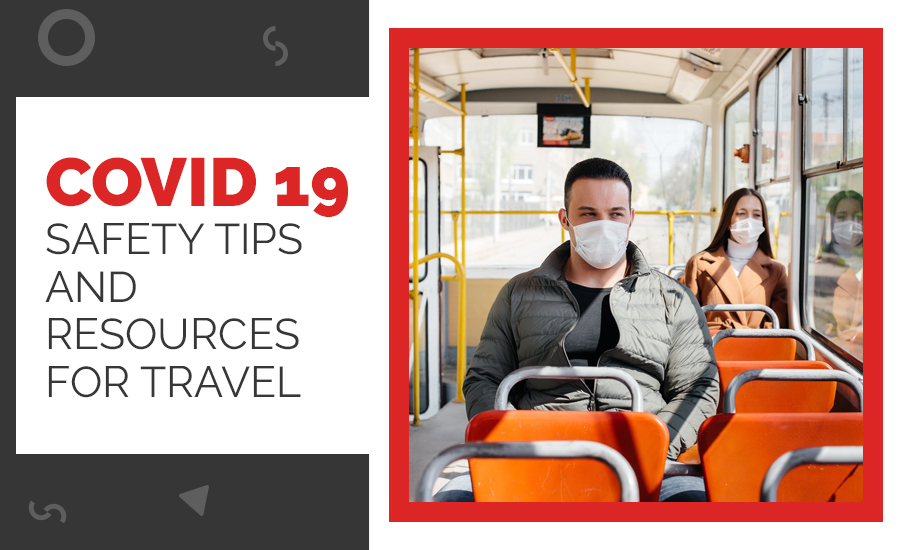It is not safe to travel during the pandemic, but with the tips from the Centre for Disease Control (CDC), you can stay safe amidst the virus while travelling.
Since we got the news about the possible pandemic in early 2020, we can say with all confidence that almost everyone has had to alter their travelling plans. Many flights were cancelled, trips have been postponed, and practically every traveller now have a different feeling about travelling.
However, this does not mean that travels are not happening again. As the lockdown restrictions have eased and many states now set up new policies for their airlines, and hotels, and also enact new quarantine policies, many travellers are now wondering what it really takes to have a safe trip during this period.
One thing is for sure, the information about COVID-19 is continuously changing, and you need to check in with the CDC and the government agencies of your local destination of choice to find out the updated information.
This places a necessity for one to be sure of the state of his health before making plans for travels. If you are doubtful about your total wellness and want to run a test for COVID, go to a private testing centre. You can locate one close to you by typing ‘PCR COVID test near me’ as the search query.
If you still think that travelling is a great idea right now, here are some tips that can be helpful.
If you are not so sure, stay at home
Information from the CDC shows that the best way to stay free from the infection or infecting others is by staying at home. Before traveling, take your time to consider your reasons and see if they are worth it. You should also examine the activities you will be involved in and their associated risks. In general, every activity that exposes you to physical contact with other humans increases your risk of getting infected. Take a COVID-19 test at your local testing centre; you can find them by searching’ PCR test near me’ on Google.

Choose outdoor and uncrowded places
Researches prove that people are more likely to get infected when they are indoors since there is a limited supply of air. Trying outdoor activitieslike skating, hiking, camping, or fishing will make it easier to avoid contact with people and limit your risk of the infection.
If you are not the outgoing type, choose environments that limit your exposure to people. Though there is no proof that you can contract the virus in water, places like the pool or beach attract more people. So, before using such areas, ensure that your destination of choice is in agreement with the CDC guidelines. When choosing a restaurant, go for the ones with outdoor sittings since there willbe better airflow.
Find out the COVID-19 containment measures for your destination
There are no general methods and guidelines for preventing the virus in every part of the world. They differ from city to city, country to country, and region to region. Ensure you research the guidelines of your destination and see how well you can conform to it. Dothey demand compulsory quarantine and is the use of face masks mandatory? Avoid places where their COVID-19 containment rules are relaxed.
Some agencies are tracking the rate of COVID-19infections, so before hopping on the plane, go through them and be sure that there is no hike in the number of new cases in the place. Also,ensure that they have adequate healthcare facilities that can take care of you incase of an injury or sickness. Remember that you may never be able to completely keep yourself safe even when you comply with all the safety measures and avoid meeting new people.
Choose your means of transportation wisely
When it comes to picking the means of getting to your destination, you can never be too careful. The central rule remains that the more the isolation between you and the other people, the better your chances of safety. But every means will require that you have your travel clean tools.
- Driving
Traveling by road is the safest right now. It involves lesser contact with people and puts you in better control of the places you stopover, and the safety precautions you take. This is more feasible if you are using your car. Also, you need to be prepared for the unknown since you may never tell if your vehicle will break down on the way and require the attention of other people.
If you want to go in a rented vehicle, ensure that the company you are renting from follows the health and safety rules. Also, go with your cleaning kits and start sanitizing your car right from when you touch the outside. Routinely sanitize both the outside and inside of the vehicle throughout the journey.
- Flying
There are pieces of evidence that the use of air filtration systems on aeroplanes can prevent the spread of viral and bacterial particles throughout the flight. However, this does not take away the fact that flying is the means of transportation with the highest risk of infection. Also, some airlines may not even be taking the precautions as serious as the others.
When planning to travel by air, ensure that you book with airlines that present proofs of their adherence to the precautions and require that all their staff and passengers must wear a mask while on-board. They should also reduce the capacity at which they fill the plane. If you see a passenger without a mask, do not hesitate to call the attention of flight attendants. Let them know that the person without a mask is putting everyone in the plane at risk.
- Bus or train travel
The safety of using a bus or train for travel is dependent on the number of passengers on board, and this is a part of the journey that you cannot control except you book private cars. If you must travel with this means, try booking when there are lesser passengers on board, like at night or very early in the morning. Every passenger should also adhere to the mask-wearing, sanitisation, and social distancing rule.
Check the safety precautions in every venue
If you will be lodging in a hotel or eating at a restaurant, call the place beforehand to find out about the precautions they are taking to keep their workers and passengers safe from the virus. Remember that services like this are offered by people who put themselves at risk to serve others so the business must prioritise the safety of their staff. If it does not, know that they will care about yours.
It can be challenging to know what is really going on at the back of the scene of every perfect looking business. But you can tell a company that is taking the precautions seriously when you call on the phone. Most of them will sound like it is their total responsibility to maintain the safety of everyone under that roof, and that they hold themselves accountable.
Four vital questions to ask businesses before visiting
- Is it compulsory for your staff to wear face masks and wash their hands immediately after attending to customers?
- How often do your staff benefit from the free COVID-19 testing?
- Do you have a sick leave policy? If a business does not make provision for their unhappy staff, they will have them come to work with the illness.
- How often do you clean the common areas?
Keep your COVID-19a safety kit handy
This should be an anthem by now: wear a mask. But in as much as you do that, remember to keep a distance of not less than sixfeet from anyone that you are not living with. Also, ensure you follow these other rules throughout your travel duration.
Tips for wearing masks:
- A protective mask is one that is well fitted on your face.
- KN95 masks and N95 respirators are the most effective tools for preventing the invasion of viral particles. But many experts say that these sophisticated tools should be reserved for the front line workers like those in the medical line.
- Much information about the prevention of COVID-19 is yet to be discovered. So, it is advised to use face masks with multiple layers. You can use a bandana over a cloth mask or a cloth mask over a surgical mask. But if you do not have the combination, it is better to wear one than none.
- According to the CDC, you must wash your reusable mask after every use. They have also provided the formula for cleaning it well. Ensure you carry all the needed materials.
- Wash your hands before and immediately after you touch your mask
- Only remove your mask from the sling. Do not pull it down your neck or chin as it can expose your nose and mouth to the viral particles on the outer surface of the mask.
To keep yourself and environment clean, keep these items handy
- Hand sanitiser with not less than 60% alcohol
- Wet anti-bacterial wipes that can be used for cleaning easily contacted surfaces like steering wheels, armrests, public toilets, etc.
- Portable soap leaves. Using hand sanitisers alone are not as useful for removing the virus as washing your hands. But if you cannot easily find soap at where you are, you will find these little packets handy.
Be flexible to the changing laws and regulations
If you are traveling out of your region or country, it is possible that a thing can come up and your flight will be delayed. Also, you may not be allowed to return to your home town because of the coronavirus as at when planned. In case the laws and regulations do not work for your good and delay your schedule to return home, carry extra necessities like medications so that you will not be stranded.
If you have not recently taken a COVID-19 test and you are willing to try, search for ‘private COVID test near me’ to locate a testing centre and get tested. You call also do it at Blood London.
Disclaimer:
The Site cannot and does not contain medical or mental health advice. The medical mental health information is provided for general informational and educational purposes only and is not a substitute for professional advice. Accordingly, before taking any actions based upon such information, we encourage you to consult with the appropriate professionals. We do not provide any kind of medical or mental health advice, other than those based on personal experience.



